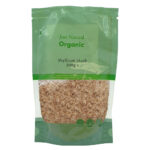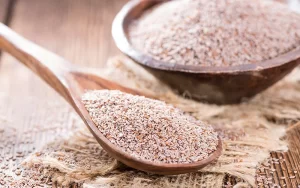



Salvestrol Platinum 2000
£46.05 – £59.45

Organic Ginger Candied Cubes 250g Just Natural
£3.69 Original price was: £3.69.£3.49Current price is: £3.49.
Organic Psyllium Husk 200g Just Natural
£6.69 Original price was: £6.69.£6.49Current price is: £6.49.
SKU:
JN263
Category: Whole Foods
Tags: # psyllium husk, #colon health, #Weight management, digestive, Fiber
Description
Psyllium Husk
Just Natural Organic Psyllium husks are derived from the seeds of the Plantago ovata plant and are commonly used as a dietary fiber supplement. They are a natural source of soluble fiber, known for their ability to absorb water and form a gel-like substance in the digestive tract. Here’s a detailed overview of their uses, benefits, and side effects:
Uses
- Digestive Health: Commonly used to relieve constipation and promote regular bowel movements.
- Irritable Bowel Syndrome (IBS): Helps manage symptoms by regulating stool consistency.
- Cholesterol Management: Reduces LDL (“bad” cholesterol) levels when included in a heart-healthy diet.
- Weight Management: Promotes a feeling of fullness, helping control appetite and reduce calorie intake.
- Blood Sugar Control: Helps stabilize blood sugar levels by slowing the absorption of sugar in the gut.
- Colon Health: Supports healthy gut flora and may reduce the risk of colon-related disorders.
Benefits
- Promotes Regularity: Its high soluble fiber content helps soften stool and ease bowel movements, reducing the risk of constipation.
- Supports Heart Health: By lowering cholesterol levels, psyllium contributes to reduced cardiovascular disease risk.
- Aids in Diabetes Management: Slows carbohydrate digestion and absorption, leading to better blood sugar control.
- Improves Gut Health: Acts as a prebiotic, nourishing beneficial gut bacteria.
- Helps with Weight Loss: Creates a sense of fullness, potentially reducing overall food intake.
- Natural and Safe: Suitable for most people as a gentle, non-habit-forming fiber source.
Side Effects
When taken appropriately, psyllium husks are generally safe, but some individuals may experience side effects, especially with excessive intake or inadequate water consumption:
- Gastrointestinal Issues: Bloating, gas, or cramping may occur as the digestive system adjusts.
- Choking Hazard: Can swell in the throat if not taken with enough water, potentially causing choking or difficulty swallowing.
- Allergic Reactions: Rarely, psyllium can cause allergic reactions, such as rash, itching, or breathing difficulties.
- Interference with Medication Absorption: May delay the absorption of certain medications if taken simultaneously.
- Diarrhea: In some cases, it may cause loose stools, especially if overused.
How to Use
- As a Fiber Supplement: Mix 1-2 teaspoons of psyllium husks with 8 ounces of water, juice, or other liquids. Drink immediately before it thickens.
- Cooking and Baking: Used as a thickener in recipes or added to smoothies and baked goods.
- Timing with Medications: Take at least 2 hours before or after medications to prevent absorption issues.
Precautions
- Hydration is Key: Always consume psyllium with plenty of fluids to prevent choking or blockages.
- Start Gradually: Begin with small amounts to allow your digestive system to adjust.
- Medical Conditions: Consult a healthcare provider if you have conditions like bowel obstructions or difficulty swallowing.
- Pregnant or Nursing: Generally safe, but always check with a healthcare provider.
Would you like advice on incorporating psyllium into your diet or tips on choosing a specific product?
Reviews (0)
Be the first to review “Organic Psyllium Husk 200g Just Natural” Cancel reply
Shipping & Delivery
Related products
Lactase 3500 30 Wafers
£10.75
Organic Almonds Flaked Just Natural
Organic Sour Cherries 250g Just Natural
Organic Walnut Halves Just Natural
Plantago lanceolata 50ml Drops A Vogel
Schuessler Nat Phos No 10 Acid Neutraliser
Seaweed Diet 60 Tablets New Nordic
Vegan Digestive Enzymes Chewable Tablets
£7.85 – £27.20
Vegan Digestive Enzymes Vegan Digestive Enzymes, is a unique proprietary complex that helps support your digestive system and the absorption
Select options
This product has multiple variants. The options may be chosen on the product page
















Reviews
There are no reviews yet.